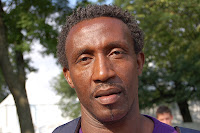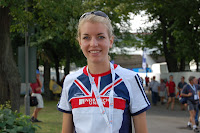 Story written by EPelle
Story written by EPelleThe rush moves me forward one beat at a time. I'm ordered to shape up and step it up. Links, links, links I hear as I push it up one final hill some 400m from my starting point.
If I've timed it right, the sound of victory will echo in my ears as I actually do turn left and head for the finish line - a small, dirt driveway down a one-lane passageway covered with barbed wire on either side.
If I've run faster than my previous best on the 11,6 km course, the 11th track song of Natasha Beddingfield's album "Unwritten", Wild Horses, will begin as I slump over after 40 minutes 20 seconds of moving, shaking, grooving and gasping for air with the likes of Rammstein, Everlast and 3 Doors Down aiding and abetting my great escape from laziness.
Night running usually gets me home to the broken wooden post which is my finish line faster than I am able to manage under the sun's watchful eye. Though the sun sleeps when I get my lazy self off the couch and take the tour around the neighbourhood, sweat still beads down my brow, and salt streams downward to my chapped lips. The four water containers I strap around my waist tend to get lighter between the ninth and 10th kilometre, when I have one massive hill remaining to test my resolve and determination.
Finishing this course under a blue heaven or under a black sky - neither of which I can see the end - is a lone journey I, myself, take each day to put myself to the test and give the body the right combination of shock and awe to both raise the fitness one notch one level while making it easier for me to sleep well into the night.
All I want is the wind in my hairKeep your composure, and try not to laugh!
To face the fear but not feel scared
wild horses I wanna be like you
Throwing caution to the wind, I'll run free too
Wish I could recklessly love like I'm longing to
I wanna run with the wild horses
Run with the wild horses,
ohwhoahh Yeah, oh oh, ye-yeah
I'm not an ye-yeah person.
However, I can relate the words of running free - wildly away from the outer stresses of life - for that is one of the reasons we have chosen this form of exercise, no?
Throwing caution to the wind on my course means running harder earlier - knowing full well the big monster awaiting me five kilometres from the moment I pushed the start button on my blue digital stopwatch on my left wrist awaits me with the same fury and power it does when I take it easy and am out for a stroll in the neighbourhood.
Lactic acid - showing no mercy - builds up with every step in those instances where I abandon reason for a fast time, a burning sensation forms between my hips, and tears - I am unsure if they are of joy - often find their way down their designated paths on either side right into my mouth.
Although I am able to err on the side of foolishness when it comes to zipping up and down the hills, I can often manage the threshold of pain and the monumental desire to stop and rest, and press on toward the next kilometre marker 250m from the base of the large hill to the set of mailboxes along a dirt path which winds between four houses in a forested area here in Western Sweden.
Pace makes all the difference in how I go about my runs - no big secret if one wants to make it out, around and home in one piece.
However, stopwatch pace has taken on another meaning for me alltogether.
Music - the beat of sound, the message of rythm - is what stirs the pot, turns the heavy wheels and what makes the improbable possible for me in the face of great disbelief. Electric guitarres and silly sound effects have brought these two feet home in grand fashion many a time under the seemingly arbitrary time goal I have set up for myself for the trip around the streets of Göteborg.
Rammstein has been a good companion of mine, though the German group and I will never cross paths in our lives. Hustling in the snow to Asche zu Asche, or decending a hill to the perfection of beats in Büch dich are paramount to my enjoyment of long, boring runs where no car, man or pet ventures out on a cold winter's day.
Fittingly, Mutter seemingly always finds its way to my ears just as I pass a left curve and begin the ascent up and over the infamous hill known as "big momma" - one of the joys of perfect pacing.
It's an appreciation of music and the arts which have given me extra reserves when I've been either too mentally or physically tired to have otherwise given it a go down the road, through the hills, across the valley, and back up to my destination.
It's been an art trying to time my inner rythmic stopwatch with the beat count offered by the musical guests who've been captured in my mp3 player.
Whether on a long, easy, doing-it-for-the-health run on a Sunday, or a pace-boggling, mind-altering crisp run to meet the wild horses in the green pasteurs usually covered with snow this time of year, music has both stilled the heart, calmed the nerves, and wired me up so high that I'd be able to create a small electric current by the rate at which my feet continued hitting the ground.
In the absense of running, I've taken music for granted - showing no appreciation for beat, rythm, style, sound or text.
I've been impatient at home - or in the car - when attempting to decide what best fits the moment. Five seconds of one note just past its life-line tends to get booted for the exact line or text for which I am searching in the next. And this process continues through two or three CDs until the original moment for which I had been searching is a long, distant afterthought.
Running with music playing in my headphones calms the nerves, takes away the angst built up from long, hard workdays, and powers me forward when the spirit really is weak. Music is a terrific compliment to having powerful lungs and an iron will.
What songs motivate you to charge on, one step at a time - links zwo drei vier - when you're out braving the elements without a single, solitary soul anywhere to be seen on - or beyond - the horison?
One which gets me past the old grandfather of a man living down the road up to the peak of the run - to the highest point I must ascend - is Landing in London by 3 Doors Down.
And when the night falls in around meWhoever you designate as "you", try taking along someone who understands your journey and can help mend your hurting lungs, tired will and doubting mind.
I don’t think I’ll make it through
Ill use your light to guide my way
Cuz all I think about is you
Country singers usually tend to do the trick!










 I consider the mark of a champion how well they handle defeat - and bounce back from set-backs - as much as how they handle the pressure when they are on top.
I consider the mark of a champion how well they handle defeat - and bounce back from set-backs - as much as how they handle the pressure when they are on top.